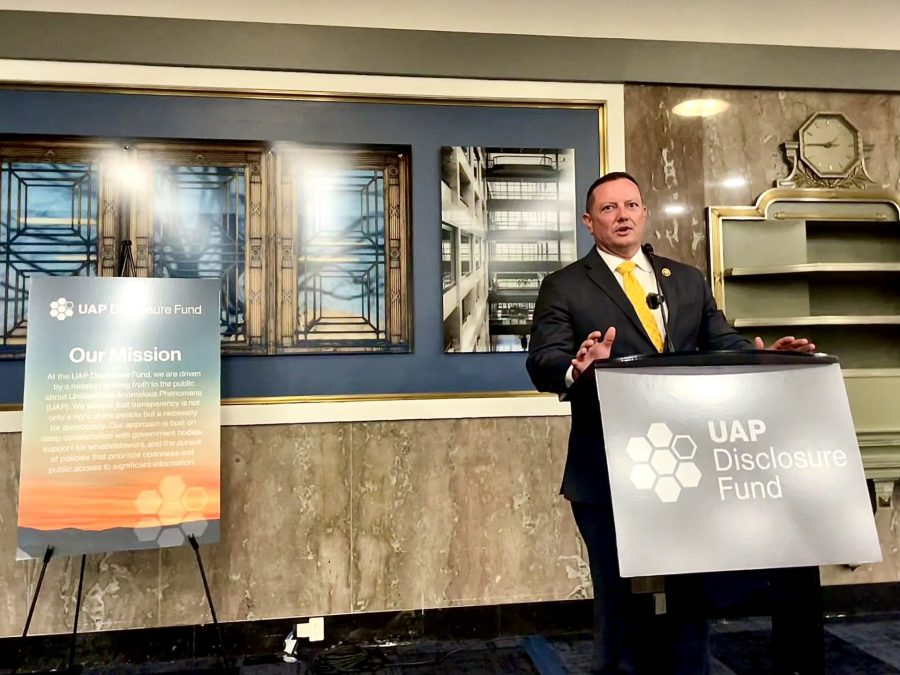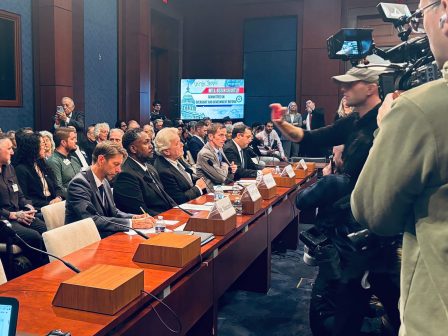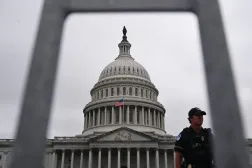Lawmakers urge Pentagon to be more transparent about ongoing UAP investigations

Republican lawmakers on Wednesday night pledged to intensify their efforts to ensure transparency and enhance public awareness about how the Defense Department is handling reports and evidence of unidentified anomalous phenomena (UAP) that might threaten U.S. national security.
They did so at an invite-only summit hosted on the Hill by the non-partisan UAP Disclosure Fund, on the heels of the House Oversight and Accountability Committee’s latest hearing on the issue earlier that day. This marked the first time in history that an advocacy group explicitly focused on the formerly more taboo topic of UAP has ever hosted an event inside the Capitol, those leading it said.
“The U.S. government has not been transparent enough about what it knows. UAP transparency is a marathon. It took many decades to result in the status quo of over-classification, and it will likely take time to find the right balance between protecting our national security and an acceptable level of disclosure,” Sen. Mike Rounds, R-S.D., noted.
Humans have long speculated about seemingly unexplainable objects that appear to do things that transcend the capabilities of modern technology — from flying saucers to modern and transmedium UAP.
The Pentagon’s secretive and complicated history grappling with this issue spans decades.
“For many years, I was entrusted with protecting some of our nation’s most sensitive programs,” Lue Elizondo, a former intelligence officer who was involved in a now disbanded Pentagon task force studying sky-based anomalies, said during his testimony at the briefing.
“Let me be clear: UAP are real. Advanced technologies not made by our government — or any other government — are monitoring sensitive military installations around the globe. Furthermore, the U.S. is in possession of UAP technologies, as are some of our adversaries. I believe we are in the midst of a multi-decade secretive arms race, one funded by misallocated taxpayer dollars and hidden from our elected representatives and oversight bodies,” Elizondo, who recently published a New York Times bestseller about his experience, testified.
Pentagon officials have maintained that they’ve found no credible evidence thus far of non-human or extraterrestrial activity.
In direct response to mounting public pressure over recent years, via the fiscal 2022 National Defense Authorization Act, Congress mandated the Defense Department to set up its latest UAP investigation team known as the All-domain Anomaly Resolution Office (AARO).
During the hearing on Wednesday, multiple lawmakers suggested the office’s ongoing pursuits, as Rep. Nancy Mace, R-S.C., put it, have “stoked suspicions that AARO is unable, or perhaps unwilling, to bring forward the truth about the government’s activities concerning UAPs.”
“I’m disturbed that AARO itself lacks transparency — even its budget is kept from the public. So if there is no ‘there’ there, then why are we spending money on it? And how much? Why the secrecy? If it’s really no big deal and there’s nothing there, why hide it from the American people?” Mace said.
Throughout the hearing, lawmakers and witnesses spotlighted examples that they said demonstrate a clear lack of DOD transparency, and the need for even greater oversight.
“While I applaud previous bipartisan legislation passed by Congress concerning UAPs, a more comprehensive approach is needed to address the broader implication of UAP on public safety and national security, as well as the socio-economic opportunities that open UAP research could unlock,” retired Navy Rear Adm. Tim Gallaudet said.
At the UAP Disclosure Fund’s event Wednesday night, Gallaudet doubled down on these claims alongside Elizondo. They were joined by dozens of stakeholders, lawmakers and others in the audience.
“UAP, UFOs are real and they’re interacting with humanity. And we know this without a doubt. Not only that, but there’s some significant implications and effects. We know that there are national security impacts,” Gallaudet, who among other leadership roles previously served as the U.S. Navy’s top oceanographer, said.
Also during the UAPDF event, lawmakers representing both chambers committed to pushing existing proposals and introducing new legislation to enable UAP disclosure and confront the risks such phenomena poses to U.S. national security and public safety.
Sen. Rounds said he’s moving to partner with “colleagues on both sides of the aisle” to re-introduce and enact a law that would establish an official board of officials to comprehensively review federal UAP records and revamp the associated declassification process.
After speaking onstage at the engagement, Rep. Eric Burlison, R-Mo., told DefenseScoop that while he was hoping for another “whistleblower to come forward to testify” on Wednesday, he was pleased with some of the materials submitted and released to the congressional record, via the hearing.
“Usually we’re blocked from even getting access to documents,” Burlison said.
“And I think the next step is going to be to get [whistleblowers including Elizondo and former federal civilian David Grusch], and to get people from AARO and some other people from the Department of Defense in a SCIF — and let’s see where the truth really is,” he added, using an acronym to refer to a secure compartmented information facility.
Burlison also acknowledged his aims to support some of the latest House legislation that he said would “force UAP disclosure,”and was put forward by Rep. Tim Burchett, R-Tenn.
One of the most vocal contemporary congressional advocates for UAP oversight across government agencies, Burchett introduced the UAP Transparency Act in May. Shortly before the hearing this week, he put forward the UAP Whistleblower Protection Act.
“Our people really like that [sort of legislation]. So I’m hoping to get more of that kind of thing [put forward]. But I’m very hopeful [incoming President-elect Donald] Trump will come forth with this information and quit trusting people at the Pentagon to tell him the right answer,” Burchett told DefenseScoop.






